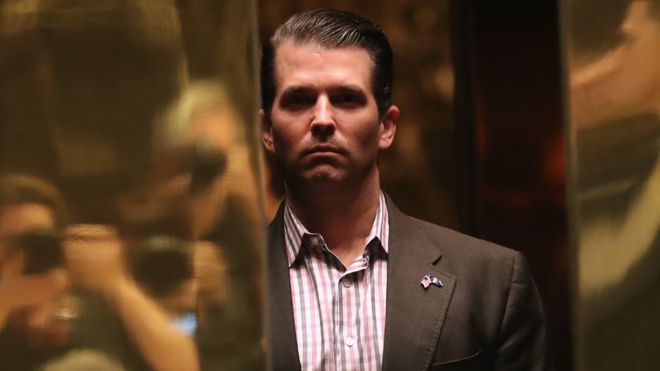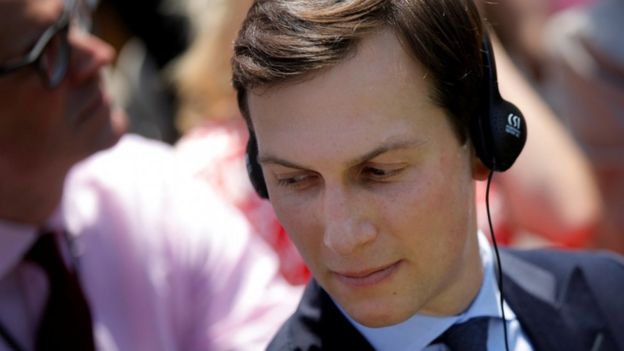 GETTY IMAGES
GETTY IMAGES
President Donald Trump's son has hit back at US media reports of his meeting with a Russian lawyer who said she had damaging material about Hillary Clinton.
Donald Trump Jr denied issuing inconsistent statements about last year's meeting.
He also suggested it was normal practice to receive information about a political opponent.
US officials are investigating alleged Russian meddling in the US election.
The president's son-in-law, Jared Kushner, and then-campaign head, Paul J Manafort, were also at the meeting with Natalia Veselnitskaya.
Mr Trump Jr insists she provided "no meaningful information" on Mrs Clinton, his father's rival for the presidency.
On Monday he tweeted sarcastically: "Obviously I'm the first person on a campaign to ever take a meeting to hear info about an opponent."
He then tweeted: "No inconsistency in statements... In response to further Q's [questions] I simply provided more details."
And he linked to a piece in the New York Post headlined "The Times' exposé' on Donald Trump Jr is a big yawn".
Later, Mr Trump Jr tweeted: "Happy to work with the committee to pass on what I know", after a Republican member of the Senate Intelligence Committee said it should interview him.
The White House says there was nothing inappropriate about Mr Trump Jr's meeting with the Russian lawyer.
When was the meeting and how did it come to light?
It took place on 9 June 2016 at New York's Trump Tower, just two weeks after Donald Trump secured the Republican nomination.
It is thought to be the first confirmed private meeting between a Russian national and members of President Trump's inner circle.
- Russia: The cloud over the White House
- How Trump's Russia trouble unfolded
- Who's who in the Trump clan
- Jared Kushner's dizzying array of portfolios
After the New York Times first reported the meeting on Saturday, Mr Trump Jr released a statement which confirmed that it had taken place but did not mention whether it was related to the presidential campaign.
However, another Times report, on Sunday, said Mr Trump Jr had agreed to the meeting after being offered information that would potentially prove detrimental to Mrs Clinton.
The paper cited three White House advisers briefed on the meeting, and two others with knowledge of it, as its sources.
Mr Trump Jr said that an acquaintance he had known from the 2013 Miss Universe pageant had set up the meeting. The Washington Post said that figure was music publicist Rob Goldstone, who has links to the Russian music industry.
In a statement on Sunday, Mr Trump Jr said he had been asked to meet "an individual who I was told might have information helpful to the campaign".
"I was not told her name prior to the meeting. I asked Jared [Kushner] and Paul [Manafort] to attend, but told them nothing of the substance."
What was discussed at the meeting?
Mr Trump Jr's statement continues: "After pleasantries were exchanged, the woman stated that she had information that individuals connected to Russia were funding the Democratic National Committee and supporting Mrs Clinton.
"Her statements were vague, ambiguous and made no sense. No details or supporting information was provided or even offered. It quickly became clear that she had no meaningful information.
"She then changed subjects and began discussing the adoption of Russian children and mentioned the Magnitsky Act.
"It became clear to me that this was the true agenda all along and that the claims of potentially helpful information were a pretext for the meeting."
Ms Veselnitskaya said on Saturday that "nothing at all was discussed about the presidential campaign" and insisted she had "never acted on behalf of the Russian government and have never discussed any of these matters with any representative of the Russian government".
What is the Magnitsky Act and who is Natalia Veselnitskaya?
Adopted by Congress in 2012, the act allows the US to withhold visas and freeze financial assets of Russian officials thought to have been involved in human rights violations.
It is named after a Moscow lawyer, Sergei Magnitsky, who had accused Russian officials of tax fraud but was himself arrested and died in police custody.
The US law so incensed President Vladimir Putin that he suspended a programme allowing Americans to adopt Russian children.
Mr Veselnitskaya is a lawyer whose clients include companies and individuals said to be close to the Kremlin and she has been at the forefront of a campaign - backed by the Russian state - to overturn the Magnitsky Act.
Russian presidential spokesman Dmitry Peskov insisted the Kremlin had no idea who she was: "We cannot keep a close watch on the meetings of all Russian lawyers inside the country and abroad."
Analysis: One piece of an unseemly puzzle?
Anthony Zurcher, BBC North America reporter
If it walks like collusion and talks like collusion... what exactly is it?
For the first time there appears to be direct evidence that three individuals in US President Donald Trump's inner circle met with a well-connected Russian prior to the presidential election where the campaign - including the possibility of damaging information about Democratic presidential candidate Hillary Clinton - was discussed.
Donald Trump Jr has denied that anything relevant came out of the meeting but that could be beside the point. Intent is key and this may end up just one piece of a particularly unseemly puzzle.
This is also troubling news for the two other principals involved - son-in-law Jared Kushner and campaign chair Paul J Manafort - who are both embroiled in their own Russia-related controversies.
In May the president insisted that he had not colluded with the Russians. "But I can only speak for myself," he said. Some in his administration may have swallowed hard at that line - and now three individuals, if the New York Times is right, are leaking dynamite to the press.
Try as they might, the Trump team cannot seem to escape this Russia-related vortex. It makes one wonder what grim reality spins beneath the surface, pulling everyone down.
How has the rest of the Trump team responded?
Mr Kushner and Mr Manafort have not commented, although Mr Kushner's lawyer said her client had previously disclosed the meeting on security clearance forms. Mr Manafort has disclosed the meeting to congressional investigators.
 REUTERS
REUTERS
A spokesman for President Trump's legal team said on Sunday that the president was "not aware of and did not attend" the meeting.
White House chief of staff Reince Priebus said the meeting was a "big nothing burger".
The New York Times said Mr Trump Jr had told the paper in March that he had not met any Russian nationals to discuss campaign-related matters.
Why is Russia being investigated?
It is alleged that Russian hackers stole information linked to the Clinton campaign and passed it to Wikileaks so it could be released and help tip the election towards Mr Trump.
Congressional committees and a special prosecutor are investigating whether there was any collusion between the Trump team and the Russians.
The investigations have yet to reveal any evidence of collusion, something the president has always denied.
Last week Mr Trump said interference in the election "could well have been" carried out by countries other than Russia and interference "has been happening for a long time".
















